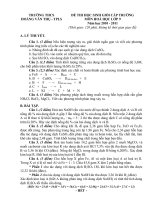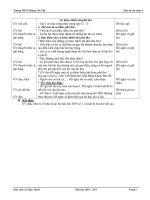trường thcs hoàng xuân hãn
Bạn đang xem bản rút gọn của tài liệu. Xem và tải ngay bản đầy đủ của tài liệu tại đây (157.44 KB, 3 trang )
<span class='text_page_counter'>(1)</span><div class='page_container' data-page=1>
<b>BRITISH COLUMBIA SECONDARY SCHOOL</b>
<b>MATHEMATICS CONTEST, 2011</b>
<b>Senior Final, Part A</b>
<b>Friday, May 6</b>
1. Consider the set<i>S</i>containing only of the whole numbers between 300 and 399 that have digits which
sum to 13. The fraction of the numbers in the set<i>S</i>that have digits with a product greater than 60 is:
(A) 1
3 (B)
1
2 (C)
5
8 (D)
5
9 (E)
2
3
2. The sum of the values of<i>x</i>that satisfy the equation 16<i>x</i>−3·4<i>x</i>+<sub>2</sub>=<sub>0 is:</sub>
(A) 0 (B) 1
2 (C) 1 (D)
3
2 (E) 3
3. Three circular coins, all with radius 1 cm, are mutually tangent.
An elastic band is stretched snugly around them. (See the
diagram.) The length of the stretched elastic, measured in
centimetres, is:
(A) 12 (B) 6 (C) 6+<sub>2</sub><i>π</i>
(D) 4<i>π</i> (E) 2√3+<sub>2</sub><i>π</i>
4. The first term in an infinite sequence is 5. For all values of<i>n</i>≥ 2, the product of the<i>n</i>thterm and the
term immediately preceding it is one less than the<i>n</i>thterm. The 2011thterm is:
(A) 5 (B) −1<sub>4</sub> (C) 4
5 (D) close to 0 (E) close to 1
5. The diagram shows top and bottom views of a cylinder partially covered with aluminum foil, the
crosshatched region in the diagram. The radius of the cylinder is 6 cm and its height is 12 cm. On the
top the radii<i>OA</i>and<i>OB</i>form∠<i>AOB</i> = <sub>60</sub>◦<sub>. On the bottom the radii</sub><i><sub>U M</sub></i><sub>and</sub><i><sub>U N</sub></i><sub>form</sub><sub>∠</sub><i><sub>NU M</sub></i> =
120◦<sub>. The total area of the covered portion of the cylinder is:</sub>
<i>O</i>
<i>A</i> <i>B</i>
<i>N</i> <i>M</i>
<i>U</i>
<i>B</i>
<i>A</i>
<i>M</i>
<i>N</i>
</div>
<span class='text_page_counter'>(2)</span><div class='page_container' data-page=2>
<b>BC Secondary School</b>
<b>Mathematics Contest</b> <b>Senior Final, Part A, 2011</b> <b>Page 2</b>
6. The map on the right shows a system of one-way trails in a
park. A single hiker begins at S. Wherever two trails diverge
at a point, she flips a coin to decide whether to go left or right.
She eventually reaches one of the destinations A, B, C, D. The
probability that she reaches<i>C</i>is:
(A) 3
7 (B)
1
2 (C)
3
8
(D) 5
8 (E)
3
4
b
<i>S</i>
b
b b
b b
b
<i>A</i>
b
<i>B</i>
b
<i>C</i>
b
<i>D</i>
7. Nine identical black marbles are to put into three cups, one red, one green, and one blue, in such a way
that each cup contains at least two marbles. The number of ways in which this can be done is:
(A) 10 (B) 27 (C) 36 (D) 45 (E) 84
8. The radius of the largest sphere that can be inscribed in a cone of radius 5 and height 12 is:
(A) 5
2 (B) 3 (C)
10
3 (D) 4 (E)
9
2
9. Consider the array of dots shown. Determine the total number
of squares whose vertices are selected from the dots shown.
b b b
b
b
b b b b
b b b
b b b
(A) 4 (B) 6 (C) 8
(D) 10 (E) 16
10. Your telescope is initially pointed at the North Star. You rotate the telescope downward by exactly
45◦<sub>and through the telescope you see a ship on the horizon. You then rotate the telescope exactly 45</sub>◦
parallel to the horizon and see a lighthouse. If you now rotate the telescope from the lighthouse
di-rectly back to the North Star, the number of degrees through which the telescope must be rotated is:
</div>
<span class='text_page_counter'>(3)</span><div class='page_container' data-page=3>
<b>BRITISH COLUMBIA SECONDARY SCHOOL</b>
<b>MATHEMATICS CONTEST, 2011</b>
<b>Senior Final, Part B</b>
<b>Friday, May 6</b>
1. (a) Find<i>all</i>solutions to the equation 3·5<i>m</i>=<i><sub>n</sub></i>2<sub>−</sub><sub>1, for which</sub><i><sub>m</sub></i><sub>and</sub><i><sub>n</sub></i><sub>are non-negative integers.</sub>
(b) Prove that you have found<i>all</i>non-negative integer solutions to the equation above.
2. Four women, all wearing identical hats, go to a restaurant for lunch, and each leaves her hat on a hat
stand. When they leave the restaurant, each woman picks up a hat at random. What is the probability
that<b>none</b>of the women picks up her own hat?
3. A barge is going down the Fraser River at a speed of one kilometre per hour. A duck, level with the
front of the barge, swims to the rear, immediately turns around and swims back to the front. During
this time the barge travels its own length. Find the speed at which the duck is swimming.
4. Determine all of the real values of<i>k</i>for which there are no points of intersection of the circle<i>x</i>2+<i><sub>y</sub></i>2=<sub>9</sub>
and the parabola<i>y</i>=<i><sub>x</sub></i>2+<i><sub>k</sub></i><sub>.</sub>
5. Two points <i>A</i>and<i>B</i>lie on a unit circle. The angle between the
segment <i>AB</i>and the tangent to the circle at<i>A</i>is 671<sub>2</sub>◦. (See the
diagram.) Find the length of the segment<i>AB</i>.
6712
◦
<i>A</i>
<i>B</i>
b
</div>
<!--links-->









